Philip Barantini On Making Adolescence: "It Was Electrifying"
The director of the record-breaking, society-shaking limited series - 66 million viewers, one audience with the PM and counting! - on class, risk-taking and the graft (and the art) of the one-shot
Quiet couple of weeks, Phil…? Come on, then, how trippy has it been?
You know what, right - when we were making it, I was like, I feel we're doing something a bit different, a bit special, do you know what I mean? And I think the UK will get behind it. But not in a million years did I imagine what it's done. Not in a million years.
You must be so chuffed. The first time we spoke was for Boiling Point [the feature film] in 2021, which was a one-shot like the short before it. Why did you think a one-er would work for this story, and what was behind the narrative decision to have four self-contained episodes?
When deciding to do a one-take, it's got to fit the story and the narrative, otherwise it can become a bit of a gimmick. And so we - me and Stephen [Graham] - were in the back of a car travelling somewhere around the release of Boiling Point, and we'd been approached to potentially do a TV series in one take. [US production company] Plan B basically said, ‘Go and have a think about an idea’. So we were sat in the back of the car, and me and Ste are massive 24 Hours In Police Custody fans-
Oh my god, I was going to mention that! I thought, he’s gonna go mad, you can’t mention 24 Hours in Police Custody to a proper fucking filmmaker…
[Laughing] I love it! Me and Stephen are obsessed by it. And we were like, what if you could do something in a certain time frame - obviously, twenty-four hours is a bit too short - whereby there is a ticking clock but also, not all your questions are answered…You’re dipping the audience in for an hour, and then pulling them out again. And then the next time they're in it, you’ve jumped forward in time and they’ve got to figure out where we are and what's going on - and there are clues around but also [we’re] leaving it up to the audience’s imagination. Audiences are smart. I don't personally like to spell things out for them, and for there to be too much exposition. I think we're so used to watching things in a specific format, certainly for telly, where you know where you are and there might be twists and turn - you can cut back to the police station, then you cut forward to the court case - and it's all very easy watching, but for this we were like, we really wanna break the mould, and go on this journey. But obviously it comes with challenges. Like, what can you show in a one take? You're limited to an hour, it’s in real time. So we really had to think hard about what each hour was. And we knew we wanted to just have four windows within this time-frame over 13 months. We wanted to see Jamie's [Owen Cooper] arrest, we wanted to see what he'd potentially been arrested for - and that's 24 Hours In Police Custody, where that reference comes from - and then jump forward a couple of days and we're with his schoolmates and teachers, and her schoolmates and teachers, trying to paint a picture of where this may have sparked from, what might have happened and how it's all come about. And then the third episode, we jump forward six months, and we're now in his head, in his world, and we're getting a sense of who he is and what may have drawn him to do this. And with the final episode, we always knew we wanted to be with the parents, and [show] what the ripple effect had done to this family. And this is a family just trying to hold it together for each other but, in turn, while they're trying to hold it together for each other, they're all falling apart.
In a one-shot, the camera’s storytelling role feels even more vital - how it moves, who and how it frames. Like episode 2 when Jade [Fatima Bojang] is kicking the shit out of Ryan [Kaine Davis] and we hold on her - her face, her rage - rather than drop to Ryan’s POV. It feels like a different role for the camera, and your DOP [Director of Photography]?
Absolutely, it's a huge challenge, you know. And it all starts with the script, and what is being said - what are the important beats that we should focus on? But also, going back to the audience, and knowing that audiences are smart and really paying attention - which is what a one-take should be doing, it should make you sit up and pay attention - myself and Matt [Matthew Lewis, DOP], we had to really figure out who we're going to hold on for those beats and why. And do we really need to see what's happening in that moment, or can we just hear it? Because there's something really powerful when you're focusing on someone's face but listening to somebody else - that is almost more powerful than seeing someone's lips and mouth move. So it was finding those moments and and also, again, being bold with it, and just saying no, I'm going to hold on this face for ten lines of dialogue, and they're not going to say anything. They're just going to be listening or, you know, Stephen's face [playing his dad, Eddie] when Jamie is being strip-searched [in episode one], we’re just going to hold on that and hear his breath. It's all about hearing his breath and really focusing on what's going on in his mind. Because we're also feeling the same thing.
Matt’s been your DOP since Boiling Point, right? Wasn’t he like 23 when you made that?
Well, he’s 28 now. Yeah, insane.
Your partnership, particularly in that pre-production process - and I’m still trying to get my head around the mechanics of it, the dialogue, the camera movements, the actor’s movements but also props, light, sound! - how did you two do it?
It’s so important that we have the locations locked in very, very early on - like, way, way earlier than you would do normally - because then we can get a map and start to read the script together. And we'll both play different characters, then stop, because there's no scenes or breaks, so we will break the script down ourselves into moments. Then we'll work on that moment, and plan it - where the camera's gonna be, where the actors are gonna be, and the movements of the actors. Where we were based in Pontefract, there’s a studio called Production Park. They haven't done much film and TV stuff before, it's mainly used for big bands to go and rehearse their European tours. So, the space is incredible and we had our offices upstairs and the studio downstairs. As the sets were being built - we built the police station set in the studio, and we also built the secure training centre for episode three in the studio - me and Matt, when the construction was finished, would go onto the set. We'd have his iPad, and we'd walk around and block it out - we just built it in moments. And this is planned way, way in advance, before any actors come near us, right? So, each episode would have a three week block: the first week would be just a cast rehearsal, so me and the cast and [writer] Jack Thorne, and Matt would be filming on his iPad. The second week, we do the tech rehearsal - everyone comes in, and now that Matt and I know where the camera is going to be, that's when we put the booms in and that's when the sound team can watch it [before] on the Friday, a dress rehearsal. And then we come in the following week and shoot it twice every day. So, yeah, really extensive planning has to be in place. Like, for example, we knew we were building the police station in Production Park, so then we had to find a house that was no more than a three-minute drive away, because we've got to drive that journey.
Did you rigidly keep to the script, or did you have to invent action to take the camera physically between places ?
The script [when] it started out, obviously Jack had come up with all these locations in his mind. And then we were like, Jack, this is not going to work - these are the logistics, and this is the map - and he would work it into the script. But in terms of the rules that we gave ourselves, where the camera is never allowed to leave a person, right? So we always have to follow somebody. And so that means crossovers, and things like that, which just keeps it moving, [plus] you always have to put your attention on something as an audience. The only time we broke that was when we fly off in episode two on a drone, and then it becomes more sort of ethereal. But then we land it, and focus back in on Stephen. And I think Jack would write things to sort of push the boundaries and go, ‘They're never going to be able to do that but I'm going to put it in anyway!’. And then I’d come back and go, ‘We found a way to jump through a window, Jack - it's going to be amazing!’. And he'd be like, ‘Oh shit, okay’, you know. The bigger things didn't really scare me, because it was more of a challenge. And Matt and I, we're like kids when it comes to things like that. We're like, right, how can we do this? But it was a real, amazing collaboration, to be honest - between everybody.
I was thinking about the lighting and the sound - the scale of that challenge alone.
Yeah, the sound team were amazing. Rob Entwistle and Kiff McManus, the two sound recorders, and their team, were just phenomenal. They did Boiling Point as well, so as soon as I knew we were going to be doing this, I immediately [knew] these guys have got to do it. Because their background is they've done big movies but they've also done [shows] like Top Gear and fast-paced documentaries. All of the actors obviously had radio mics on, and we also had two booms, so it was like a dance. A choreographed dance. And we also planted mics in the cars and [places] where a boom couldn't fit in. And, you know, we’d be rehearsing the moment and I’d come back to Rob and Kiff and [say], ‘Is that all good? Can you?’. And they were like, ‘We've got a plan. Don't worry’. And my mind would be blown. Just the enthusiasm from every single member of the team, the whole crew, was unmatched in anything that I've ever done. It wasn't a case of people being, ‘Oh, I'm not sure whether we can do that’. It would be, ‘Right, how the hell are we going to do it? Let's fucking put our heads together and come up with a plan’. And it was just electrifying, you know what I mean? My energy is always up there, and so is Matt’s, and so to have that matched by every single member was just, as I say, like nothing I've ever experienced.
As you say, as a director you’re asking slightly different things from your crew, and your actors, too. How does it change your relationship with them?
For me, it's about giving them power to be able to speak up and say, I've got an idea or, this is not going to work or, can we try this? With the crew it was giving them that empowerment to have a voice. And I say it on day one: there's no hierarchies on my set, there's no ego, we're all in it together. We can't make this project work without every single member of the team, right? And there was actually a little moment that really sticks out to me - in episode four, there was a beat where Stephen's character gets to the till, and then we pull focus to [daughter] Lisa [Amelia Pease], who says, ‘Are you alright, dad?’. Now I said, let's focus on Lisa at a specific point, on a certain beat and we rehearsed it, and the focus puller [Sean Beasley] pulled at a different time. And I said to him, ‘I think you pulled a bit later’ - or a bit sooner, or whatever it was - and he said, ‘My instinct was to pull’. So, I said, ‘Okay, let's try it again, let's have a look’. He did it again and I was like, ‘You know what, you're absolutely bang on. That is exactly when we should do it. Your instincts were right’. And for me, I don't consider myself to have that much of an ego, so I'm not going to be like, ‘It's my idea, so it has to be the idea’. He was right, so that's what we go with. It's always the best idea wins, right? And then in terms of the cast, it's the same thing - you've got to give cast the freedom to be able to to play a little bit around the script. Jack was wonderful at that. You know, some writers are really precious about the words, and that's absolutely understandable, but in my opinion, the actor is the person who's going to bring this character to life [so] they need to be able to put their own spin on it in a certain way - without, you know, them going off and doing a soliloquy or a bloody monologue - without it being in the script. Certainly giving them the power, saying, ‘If you drop the the baton, someone's going to pick it up for you, so don't worry about it. Don't feel like, Oh, you fucked it all up for everybody. Because ultimately, the audience don't know what's coming next, right? But [it’s] just trusting each other’. And I said, ‘Look, all of you know the line, know the text, but just listen - listen to each other and be really truthful in the moment. Just be in that moment’. Because in a one take, you can't be anything else but in the moment. If you're thinking about what you're going to do next, then you might mess it up - but if you're just in the moment and present, then absolute gold will come of it.
I’ve gotta say, I’ve heard from crew who do say they love working for you. You’re from a working-class background and you didn’t go to film school - do you think that gives you a different sensibility? Makes you want to create something different or do it in a different way?
Yeah, I think so. For a long time, in the back of my mind, I was like, I'm not meant to be here. I'm really not meant to be here. And someone's going to tap me on the shoulder and tell me to to get back to where you belong type thing. And I still have that, don't get me wrong, but I feel now that there are rules that have been put in place, but rules are there to be broken. And I'm smashing through them because at the minute, my mindset is like, what have I got to lose? You know what I mean? Like, okay, let me just go for it, see what happens. I think because I didn't train as a director, didn't go to film school or anything like that, I understand it needs to feel really real and believable and I think it's just an instinctive thing for me. Every job that I do, I always say I want someone to come and shadow me, someone different every week for the whole shoot. And it doesn't have to be someone who goes to film school, it could be someone who just wants to get into it, and has never been on a set before - come and hang out and see how it works. But if you're in film school, it's that as well, because they can teach you so much but you cannot beat being on a live set. Just come at it your own way, just try it. There's no set way of doing things. And for me, back in the day when I was acting, I would put directors on this sort of pedestal, and be like, they are someone, I would never be able to do that because I've not been educated in the way that they have. Or, you know, I didn't go to film school, I'm just some kid from Huyton in Liverpool, there's no way I'll ever be able to do that. And now: there absolutely is, and anyone can do it, anyone. [I know] how important it is to believe in yourself.
And how important are your partnerships and collaborations? Especially with other working-class people? On this you worked with [iconic indie production company] Warp Films and producer Mark Herbert; plus Matriarch, Hannah Walters’ and Stephen Graham’s production company.
I mean, I've been friends with Stephen for over twenty years, and we're like brothers, and Hannah is like my big sister. I just love them to bits. And we're going to work together forever. But they are paving the way. And Mark Herbert and Warp Films - from when I first was starting out, I remember thinking, ‘They're my people. They're a bit of me’. And then I met Mark a few years ago for the first time, in Manchester, in a cafe, and I was just like, Oh my God, he's just normal. It’s Warp Films, who’ve done some of the best films, in my opinion, you know, ever. And he's just sound! He's a working-class, sound, sound fella. And we got on like a house on fire. Again, I would consider Mark a brother now. And so it's just finding your people. We just all get each other, and I think we've come up the same way - a similar way, certainly - and we've fought for it, and we still are, you know?
One last question, which is kind of related, and kind of not. I thought it was genius to make the family a normal, likely lower-middle-class family. There’s none of the usual tropes about ‘benefits culture’, poverty, boys raised by single mothers. It could be any family, he’s a ‘normal’ boy in a normal school. How important was that in the framing of the story?
Incredibly important. That was one of the first things that we spoke about on that car journey, me and Stephen. We didn't want this to be [a situation where] you immediately blame the parents. Because that's what we do, that's what society makes us do. You blame the parents. Jamie didn't come from a dysfunctional family, his dad wasn't physically abusive to him, his mum's not an alcoholic or a drug addict or whatever. I mean, they're a hard-working family, like lots and lots and lots of people can relate to that. And the idea was that it’s a ‘why done it’, but also, ‘this could be my kid, this could happen to me, I could be that parent’. You know, Eddie's a hard working man, he's got his own business; [Mum] Manda [Christine Tremarco] we always imagine works as a manager at John Lewis; the daughter goes to college, and she's incredibly smart - and Jamie is as well. [But] he's gone down some dark, dark holes, and been influenced. And so it was very important that that was the narrative we were telling.
We’re out of time - massive congratulations, again.
Thanks, mate. It's mad, honestly. But you know, I'm over the moon. The fact that we've got a conversation started - now, you know, in fucking Parliament! - and we're talking about showing it in schools. And that's the biggest win for me. Everything else that comes with it is a bonus, and it's a beautiful thing to feel and see and and watch it thrive. You know when it came out, we were like, we're sending our baby off to college! Let’s hope that people like her and she gets on with people.
People love her…
Yeah. It’s amazing.

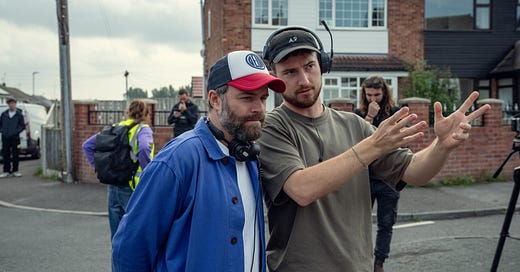


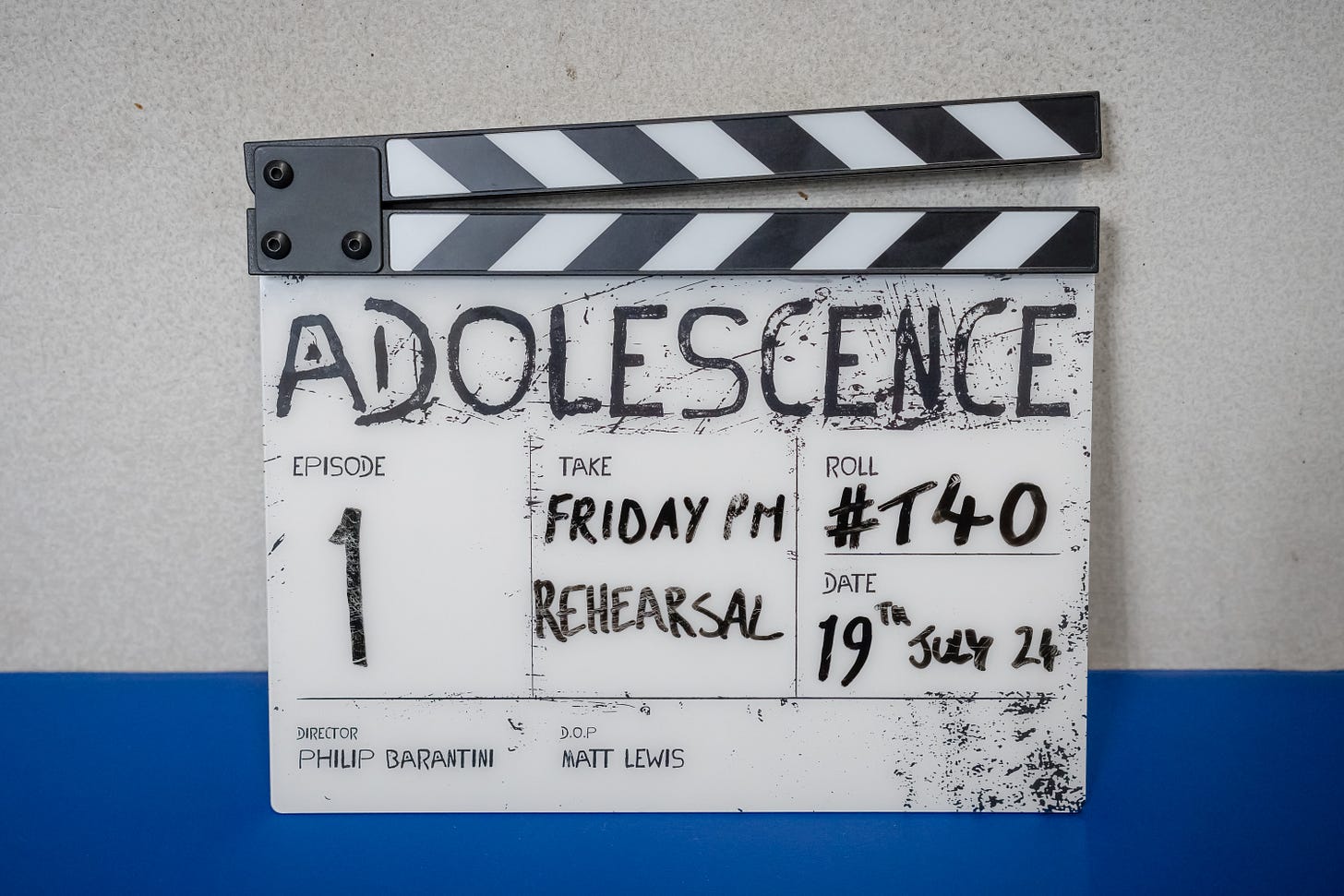
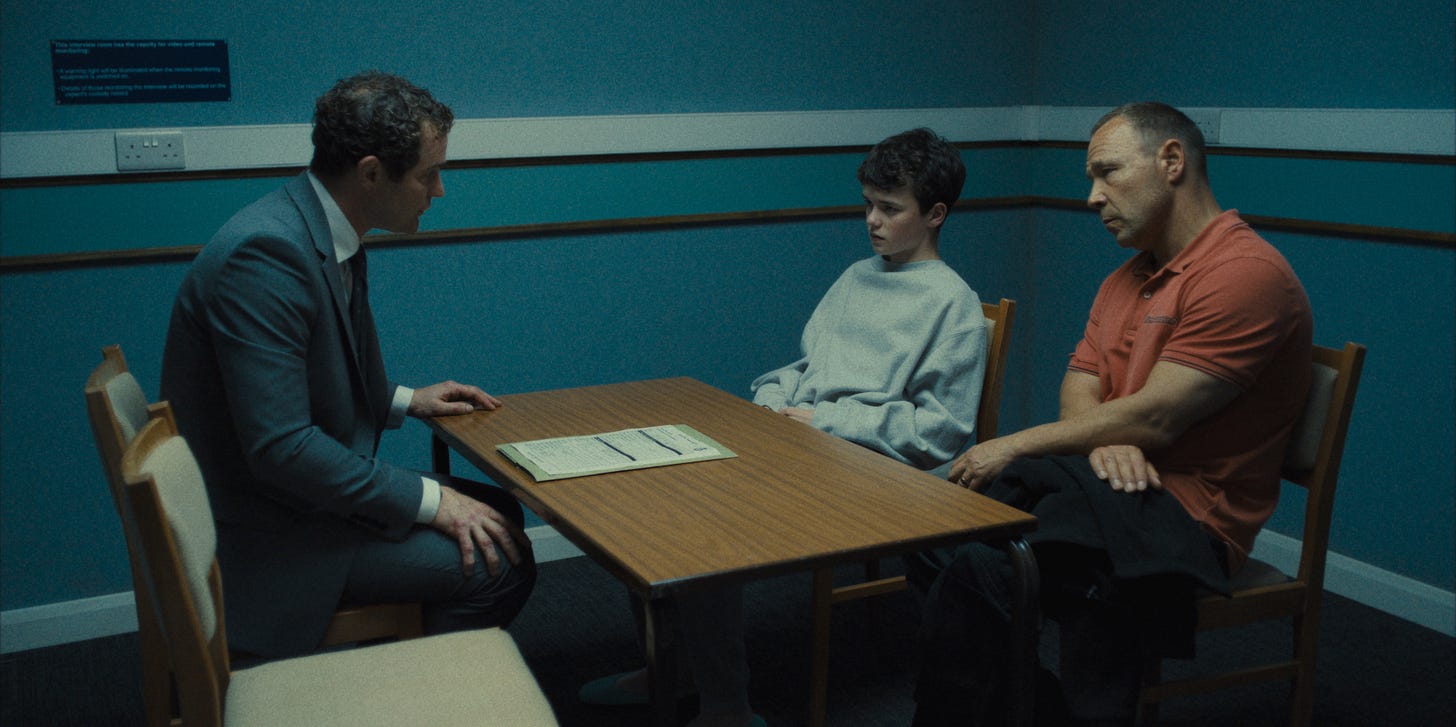

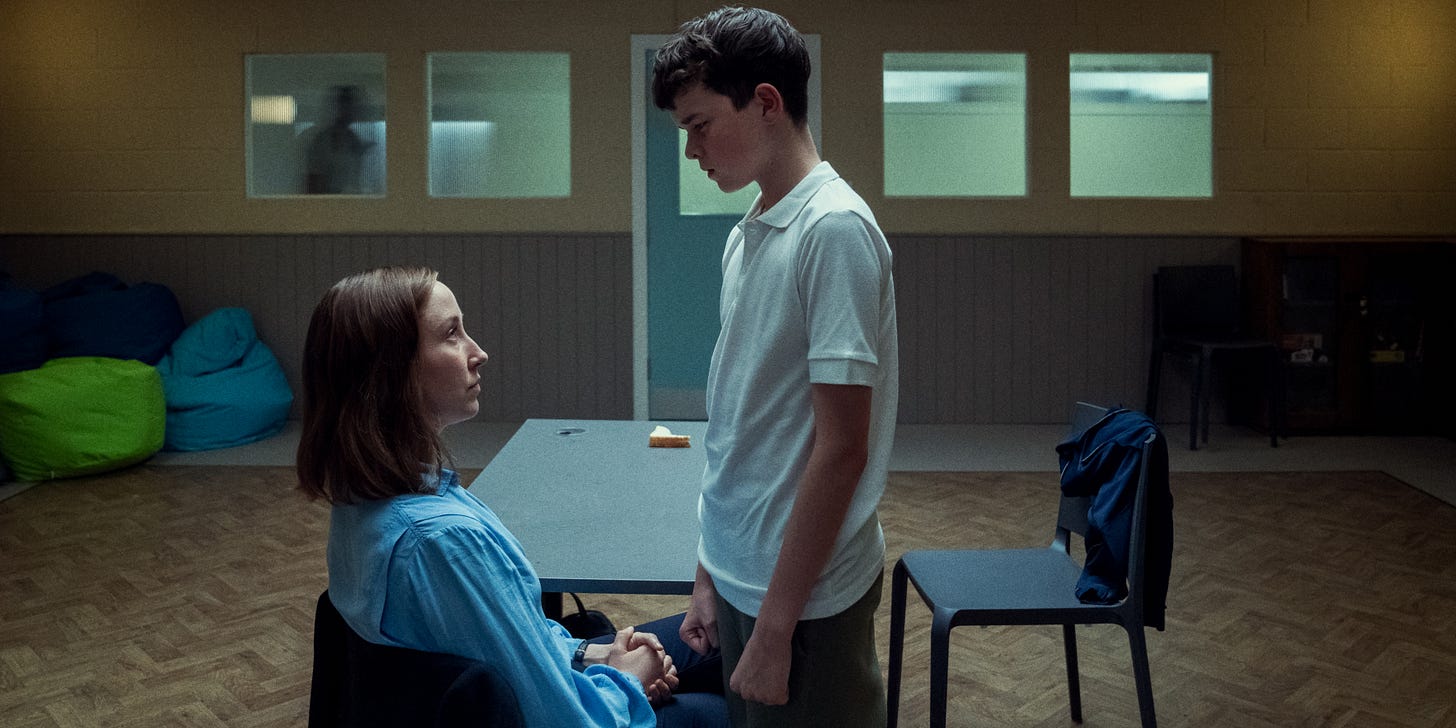
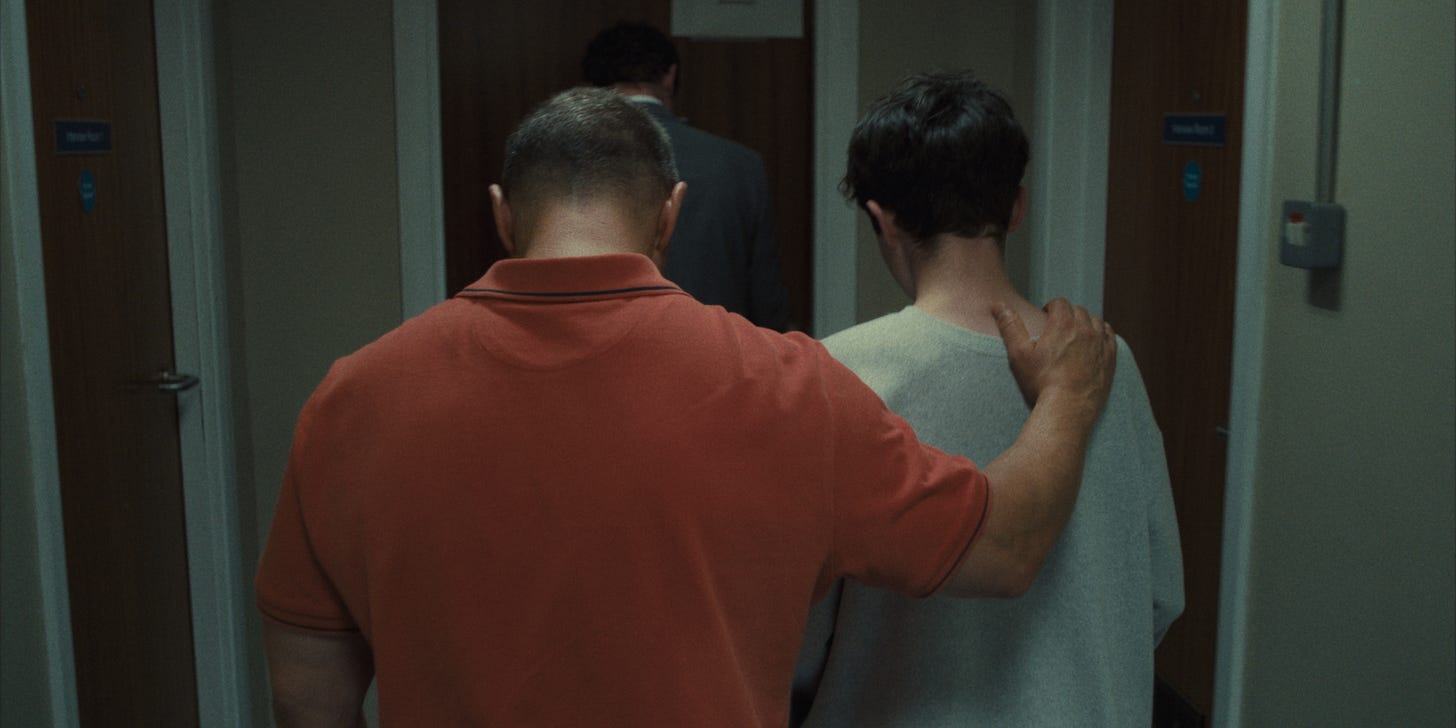
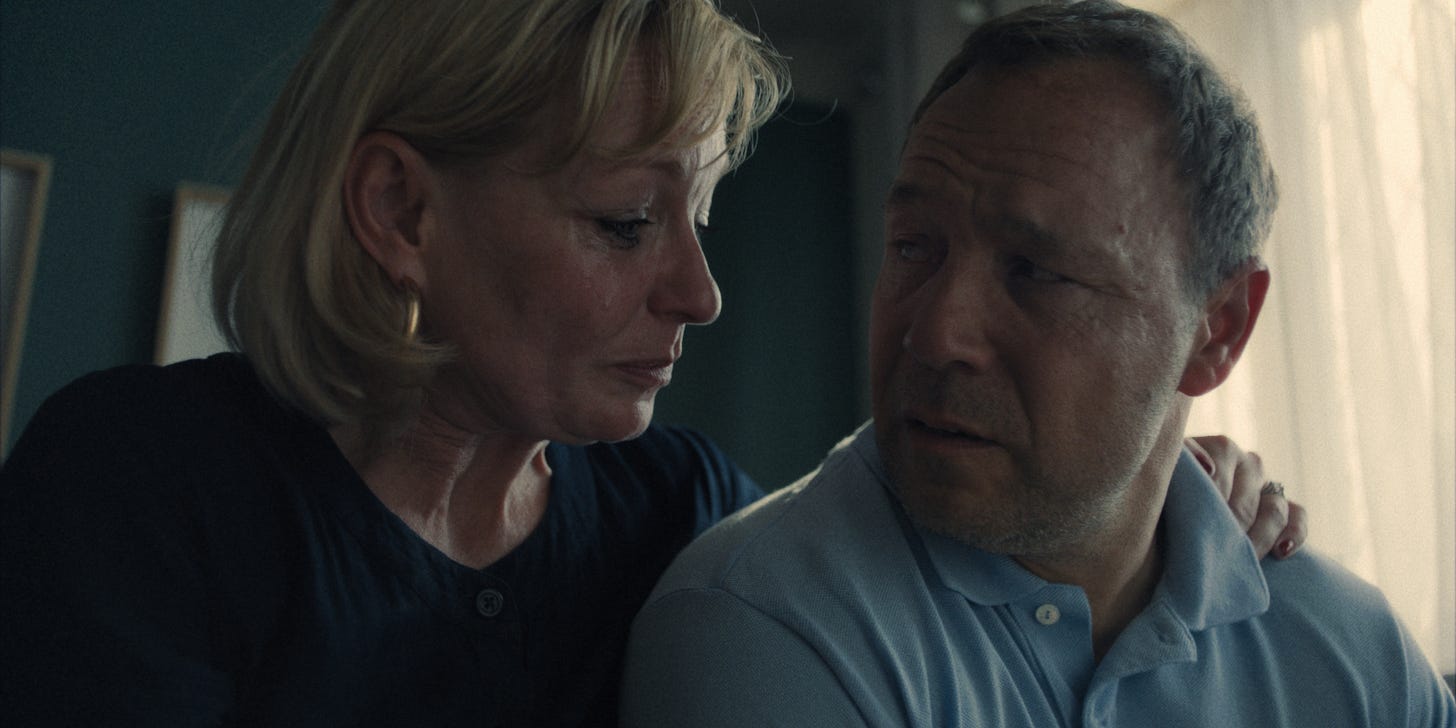
What an absolutely cracking piece - there's been so much noise around this show of late - this cuts through a lot of it - to get right into the technical and contextual stuff. Brilliant conversation - full of fascinating insight.